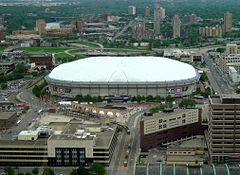 Hubert H. Humphrey Metrodome, the site of the game | ||||||||||||||||||||||
| ||||||||||||||||||||||
| ||||||||||||||||||||||
| Date | January 17, 1999 | |||||||||||||||||||||
|---|---|---|---|---|---|---|---|---|---|---|---|---|---|---|---|---|---|---|---|---|---|---|
| Stadium | Hubert H. Humphrey Metrodome, Minneapolis, Minnesota | |||||||||||||||||||||
| Favorite | Vikings by 11 | |||||||||||||||||||||
| Referee | Walt Coleman | |||||||||||||||||||||
| Attendance | 64,060 | |||||||||||||||||||||
| TV in the United States | ||||||||||||||||||||||
| Network | Fox | |||||||||||||||||||||
| Announcers | Pat Summerall and John Madden | |||||||||||||||||||||
The 1998 NFC Championship Game was the 29th title game[a] of the National Football Conference (NFC). This National Football League (NFL) playoff game was played on January 17, 1999, to determine the NFC champion for the 1998 NFL season.[1][2] The visiting Atlanta Falcons defeated the heavily favored[3] Minnesota Vikings 30–27 in sudden death overtime to win their first conference championship and advance to the franchise's first Super Bowl appearance.[4] As a result of their loss, the Vikings were eliminated from the playoffs and became the first team in the history of the NFL to compile a regular season record of 15–1 and not win the Super Bowl, a feat that was also later accomplished by the 2004 Pittsburgh Steelers, 2011 Green Bay Packers, and 2015 Carolina Panthers, as well as the 2007 New England Patriots who had a 16-0 season.[4][5]
The game is considered one of the most memorable conference championship games in NFL history.[6][7][8] Entering the playoffs, the Vikings were the favorite to win the Super Bowl,[9] as they had set the NFL record for most points scored by a team in a single season. They had gone undefeated in their home stadium, the Hubert H. Humphrey Metrodome, during the regular season, and their placekicker, Gary Anderson, had become the first kicker in NFL history to convert every field goal and extra point attempt in a season.[9][10] At a critical moment late in the game, Anderson missed a field goal for the first time that year, which, if converted, would have given the Vikings a nearly insurmountable 10-point lead.[5][9][10] Instead, the Falcons scored a touchdown to tie the game on their ensuing drive and subsequently won by a field goal in overtime.[11] Due to its impact on the game's outcome, Anderson's missed field goal has since become the focal point of the loss.[9]
The Falcons lost 34–19 to the Denver Broncos two weeks later in Super Bowl XXXIII.[4] The Falcons would not return to the Super Bowl until the 2016 NFL season, when the Falcons lost in overtime to the New England Patriots in Super Bowl LI. Although the game long stood as the proudest moment in the history of the Falcons franchise,[12][13] the 1998 NFC Championship Game has been remembered for the effect it had on the Vikings players and their fan base,[10][14] as it is seen by some sportswriters as one of the most devastating losses in NFL history.[15]
Cite error: There are <ref group=lower-alpha> tags or {{efn}} templates on this page, but the references will not show without a {{reflist|group=lower-alpha}} template or {{notelist}} template (see the help page).
- ^ "Atlanta Falcons At Minnesota Vikings – National Football League Game Summary" (PDF). National Football League. January 17, 1999. Retrieved July 31, 2016.
- ^ "Atlanta Falcons at Minnesota Vikings – January 17th, 1999". Sports Reference. Retrieved June 28, 2016.
- ^ Newberry, Paul (January 28, 2017). "As Falcons return to big game, remembering the Dirty Birds". Associated Press. Archived from the original on January 28, 2017. Retrieved March 12, 2017.
- ^ a b c McGinn, Bob (September 15, 2012). The Ultimate Super Bowl Book. Minneapolis: MVP Books. pp. 254–259. ISBN 978-0-7603-4371-5.
- ^ a b Schatz, Aaron (August 2006). Pro Football Prospectus 2006. New York: Workman Publishing Company. pp. 73–75. ISBN 978-0-7611-4217-1.
- ^ Silver, Michael (January 25, 1999). "A Real Head Turner". Sports Illustrated. New York: Time Warner.
- ^ Chase, Chris (January 18, 2017). "The 13 greatest conference championship games in NFL history". Fox Sports. Retrieved February 25, 2017.
- ^ "Analysis: Top 15 Championship Sunday games in the Super Bowl era". Fox Sports. January 15, 2014. Retrieved February 25, 2017.
- ^ a b c d "Top 10 Foul-Ups". NFL Top 10. August 1, 2007. NFL Network.
- ^ a b c "The 1998 Minnesota Vikings". America's Game: The Missing Rings. October 16, 2008. NFL Network.
- ^ Fox Sports broadcast of the 1998 NFC Championship Game (Television). Fox Sports. January 17, 1999.
- ^ Magliocchetti, Geoff (January 21, 2017). "Remembering the 1998 Atlanta Falcons". Sports Grid. Retrieved March 18, 2017.
- ^ Weiner, Dan (May 13, 2009). "The 1998 Atlanta Falcons: The Team That Proved Anything Is Possible". Bleacher Report. Retrieved June 28, 2016.
- ^ "Top 10 Snakebitten Franchises". NFL Top 10. July 31, 2009. NFL Network.
- ^ "Top 10 Devastating Losses". NFL Top 10. September 18, 2015. NFL Network.